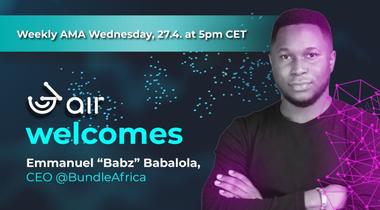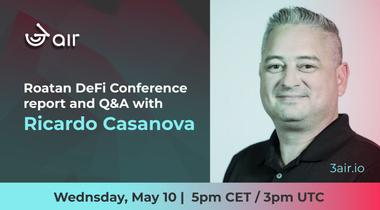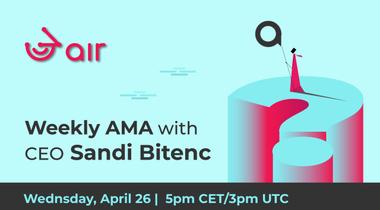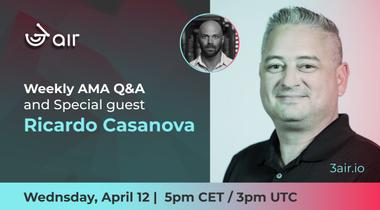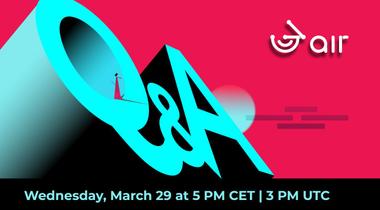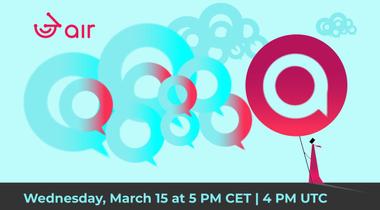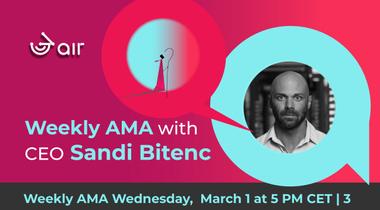This is a transcript from our weekly YouTube live AMA:
Anita Mlakar: 00:06
Hello, everybody and welcome to 3air’s AMA, it is Wednesday, it is 5 o’clock and we are back. We are here with you. And I hope you’re doing fine. As fine as we are because it’s a beautiful day out there. And of course, we’re looking forward to this AMA.
00:24
I would like to invite you, of course to be a part of this, to write comments, to write questions if you’re live with us. Also, to be a part of our channels, our communities on telegram, on Twitter, on Discord, you’re welcome to join us there if you are not there yet. Because we are talking every day about 3air and the project of bringing internet to Africa.
00:49
Anita Mlakar is my name, I’m the host of these AMAs. And I’m seeing that there are some of you already with us. And I’m really glad that you are here. But first, as always, let me do a short introduction of 3air and about what we are doing.
01:08
So, Africa lacks connectivity and digital resources to scale business causing a detriment to everything from commerce and communications to education and health care. With the right infrastructure, we can change this course for good. And that’s why 3air will empower a new upgrade in infrastructure and in technological implementation, bringing broadband internet, digital TV and telecom to the entire population. This will automatically unearth new business possibilities, streamline educational resources, better health care network connectivity, and much more. This will be supplemented by a new platform designed by 3air to foster Global Partnerships for development across the region. Our goal is to drive through financial inclusion and equal opportunities for billions of people who still don’t have access to high-speed internet. And 3air empowers them to make life changing progress in work, banking, education, and health. So, bringing in connectivity, and in a way providing job opportunities. Education initiatives is the best African need and 3air is set to do all that. Yeah, that’s our project. That’s our goal. Let’s invite the CEO of 3air Sandi Bitenc.
02:33
Hello, Sandi.
Sandi Bitenc: 02:35
Hello, Anita. Hello 3air family. How are you?
Anita Mlakar: 02:39
I’m great. I’m doing great. I hope you’re doing great too. I see or I hear that you have some problems with health. Is that so?
Sandi Bitenc: 02:48
Yeah, I got sick a bit in Amsterdam. I did a COVID test. I shouldn’t be spreading COVID around. So, but I don’t feel exactly too Olympic right now.
Anita Mlakar: 03:05
I can imagine. You know, it’s surprising in a way because if we don’t have COVID, then we don’t have anything like there are no other diseases, you know, but there are also other influenza and other diseases out there. So yeah, we should take care of ourselves, right? Even if we don’t have COVID.
Sandi Bitenc: 03:26
It is a bit strange right now. It’s like, I really feel when I go out right now and I start coughing somewhere or sneezing or something like that, I still think like everybody’s watching me right now. It is a bit strange.
Anita Mlakar: 03:41
Yeah, I know. We will have to get used to that. I hope that we are coming to a normal situation. And this will be just a bad memory once you know it.
Sandi Bitenc: 03:50
Let’s hope that so I need to say that I was quite surprised in Amsterdam. There was nobody wearing any masks nowhere at all. People were like really cheerful all over the place. There were a lot of parties going on. Networking, restaurants were full. Even the hotels were really full. Then also on public transportation nobody is wearing masks. I took the train to London. I’m in London right now. Here also even though they still say you should be wearing masks, nobody’s wearing masks, nowhere. So, it kind of looks like that. That thing is over right now with COVID but let’s see. COVID- that some additional restriction doesn’t come back or that really know everything starts spreading like crazy and we end up in lockdowns again.
Anita Mlakar: 04:55
No, let’s no not do that again. Oh my god. Sandi like you said, you are in London and not just enjoying a holiday but you’re working right?
Sandi Bitenc: 05:09
Yeah, kind of. I wouldn’t be enjoying right now the holiday either way and kind of restrict myself to go out only for the things that are really need to. But yeah, here is the Financial Times is organizing the first crypto event so I’m attending that one. Thankfully, a lot is actually online but right after the call, I’ll actually go and attend the live one there. It’s a bit different. I just wanted to experience that one. It’s totally different, people are totally different speakers, the topics are different. And we can argue about that if they’re good, or anything like it. But for sure, there are at least something that we should think about and keep. It is relevant. So, the majority is from institutions, banks, regulators and although to be honest, the majority that I’m hearing is like really stupid. Sorry, but it is. It’s there. And we cannot change it in that sense. So, we’ll need to kind of accept it.
06:25
The thing that angers me the most is they’re speaking about regulatory. Like, that’s the only way to go. And you know, that crypto in a sense needs to be really regulated else. Everyone will scam everybody and everything. And nobody’s actually speaking about the downsides of the possible exploitation of the regulators because that’s also a reality. So that’s it, it’s really one sided. But on the other side, if you go to a crypto event, it’s also one sided. So, you know, having knowledge about both and then combining them. It’s something that is then I think, can be considered something as a truth.
Anita Mlakar: 07:13
Yes, true. Sandi, we have a special guest coming up today. And we’re really looking forward to that. And I suggest that we do invite Him in. We will talk about of course, what is going on right now. Also, about 3air and everything. But first, I would really like to invite Emmanuel Babalola. He is our special guest today. So, hello!
Emmanuel Babalola: 07:41
Hey! Hi guys! Hi Anita.
Anita Mlakar: 07:45
How are you today?
Emmanuel Babalola: 07:48
Good. Hi, Sandi. How are you doing?
Sandi Bitenc: 07:50
I’m good now. You got me a bit nervous.
Emmanuel Babalola: 07:56
Strange. I am stuck in traffic. Somewhere in Lagos, Nigeria. For the Nigerians watching this. I think we can all relate this but we’re here. I’m here now. And I’m really sorry for joining late.
Sandi Bitenc: 08:10
No worries. You are on time. So, no problem. I hope you’re not driving.
Emmanuel Babalola: 08:16
I am not driving. I have someone. I am talking here.
Anita Mlakar: 08:20
Okay. Safety first. You know Babz safety first, then everything else. So, thank you very much for being here.
Emmanuel Babalola: 08:29
I really love the 3air community. So, I just had to be here for this.
Anita Mlakar: 08:34
Yeah. Thank you. Thank you very much. We are really happy to have you here. Just a short introduction. Babz, or Emmanuel Babalola is the CEO of Bundle, Africa. This is Africa focus social payments app for cash and crypto playing a major role. You are in the growth of crypto adoption in the continent. You are also former director of Binance Africa. And we would really like to hear more about you Babz. So, what are you up to right now? What are you doing?
Emmanuel Babalola: 09:09
Yeah, amazing stuff. Thank you so much Anita for that, very amazing introduction. I think for the most part, my focus has really been trying to use technology to improve the African experience. And primary for me, is just seeing how crypto has a large role in that future. Helping Africans move from just being the backburner to being one of those regions that actually play a very solid role in this new industrial revolution. And that has played out over the past few years where we’ve seen, you know, Africa and African nations take more of the front seats. When you look at crypto across the world, you know, you see, I think there was a time for years, several years when Nigeria was the most interesting crypto on Google search. Now we are number two after our server, though, for obvious reasons. And then, you know, we’ve seen a peer-to-peer trade grow in all that time. So, I think from my side, I derive joy in you know, helping more and more people have access to this new technology, I believe that crypto is the largest wealth transfer in the history of, you know, man, and seeing more Africans get involved. And seeing more people across the continent earn a living from this industry is something that I’m really proud of.
Anita Mlakar: 11:01
Yes, true. Just to invite everybody, here is the opportunity, of course, to ask questions to Babz also, so write them down in the comments, and we will address them later. Just tell me Babz, how did you come across crypto and when?
Emmanuel Babalola: 11:17
Yeah, so I think this was early 2016. When I was walking mainstream in Web 2.0, I got involved in a lot of projects in terms of, trying to, to grow, where we were basically building a software to help organizations manage their membership, and just enterprise solution for NGOs, basically. And then, you know, I think I heard about crypto for the first time from one of the multilevel marketing programmes. And then, you know, naive, very young then I just said, okay, let me get involved and see how this works. And then I think, participating in that programme, without a bank account was something that I was really curious about. And then, you know, I decided to actually look into the technology a bit more. And one of the things I realized is, this is actually the money of the internet, this is how people will transact in way, you know, chatting online, people were doing business online, we’re helping, our goal was to help businesses come online and we are seeing how now beyond interactions online, people can actually transfer value on the internet. And for me that was important. And I think I started listening to Andreas Antonopoulos then, very awesome guy, I really recommend his books, and his videos, he has a lot of free content out there. So that was my first crypto teacher as I watched all its contents, you know, and after, like a week, I was like I have to do this. I think it took me less than six months to quit my job. And I am still, I’ve been doing crypto full time since 2017 actually.
Anita Mlakar: 13:24
That’s great. And I read somewhere that you after that in a year or years after that you organized more than I don’t know, 300 events.
Emmanuel Babalola: 13:33
A lot of events. So, for me, it was really about connecting the people. So, we started attending meetups and hosting meetups, free meetups at eateries, in churches, and in everywhere, you know, and it wasn’t because we knew a lot then, in fact, we didn’t really knew a lot. We just knew the basics. And we wanted to share that with as many people that would want to listen. So, these meetups are not crowds of 1000 people like now, you know, now we do an event to see everybody’s there. Then, you know, three or four people or with 10 people. And it was pain to even if you just started by explaining how it’s not a scam, how it’s not fraud. Today, now, crypto is not like the cool kids thing, right? It wasn’t always like that. So, yeah, those are the early days of my journey.
Anita Mlakar: 13:37
But you have to start somewhere. You know, it’s also with three or four people at the beginning and then you come to 1000s. That’s how it goes. Is still that feeling in Africa for Africans? Maybe because of the lack of information that cryptocurrency is a scam. Do people still believe that?
15:01
So, I think for the large parts, crypto is, that’s whole story of crypto being a scam, and crypto- it’s grown less and less over the years. We’ve had less and less people. I think back then if you took Nigerians let’s say, you took in Nigeria, specifically, if you took, let’s say, 10 people back in 2016 and ask them, what is Bitcoin or crypto? I think only maybe two of them would have heard about crypto before. And one of them thinks it’s a scam. Now, it’s very different, at least all of them would have heard about crypto, and maybe two would think is a scam for the remain they just think it’s one thing for the elites and for the you know, and that’s also something we’re trying to change that’s even now where people don’t really think it’s the scam, there are still scams in the industry. They’re still projects, they’re, you know, just come to just take people’s Bitcoin and people’s money away.
16:13
So, one of the things you’ve done is to find a balance. Yes, Bitcoin it’s not a scam. However, there are scams in the space and this and this are the things to look out to identify them and this is how to, you know, secure yourself in this entire ecosystem. So, I think the key thing is education really, the more you know we have the more people organize events like this the more people talk about crypto to help people understand what it is, what it isn’t and also how they can take advantage of it I think it will greatly reduce. That’s amount of people which are very few now by the way that think crypto is a scam, so I think for the most part of Africa with all you know central bank saying or they have their central bank-
Anita Mlakar: 17:13
Babz, I think, we’ve lost Babz for a second now. Maybe it’s the connections still.
Anita Mlakar: 17:29
Okay, I don’t know if it was just me Babz or also everybody else. We lost you just for a second. You had bad connection, but we do here and see you now. So, you’re back. Okay, that’s good. You said education, educating people. I would like to hear more about your Binance Masterclass. This is really free blockchain education, men’s for the masses, for people. And more than 400,000 people has already been in those classes.
Emmanuel Babalola: 18:14
Hello? So, you asked about masterclasses, right?
Anita Mlakar: 18:27
We do have some problems, I think with connection. Babz? I would really like to hear more about it. I hope that he comes to a better connection soon.
Emmanuel Babalola: 18:46
So, can you hear me now?
Anita Mlakar: 18:49
Yes, I hear you.
Emmanuel Babalola: 18:49
I think as car moves from place to place. So, we just, you know, lose connection and stuff but let me just quickly just touch on the master’s class. So, for Binance Master Classes, we kicked off in 2019, actually. And back then, one of the things we realized was, the barrier to entry for crypto was a bit higher. What I mean is then it costs at least $200 to learn about crypto in a formal setting. Let’s say you wanted to pay for a course, it was great because people like found a source of income by teaching other people about crypto and charging them money for it. However, what happened was, they basically was increasing the barrier to entry. So, this thing that a lot of people don’t know about, even I had to pay to learn about it. So, we wanted to solve that problem because if you spend in Africa, if you spend $200, trying to learn how to trade and then you now spend another maybe $500 to look out for some trade. You know, you’re ready. You know, some people just have $200 They don’t have anymore. So, the key thing was removing that barrier, and providing quality education for free.
20:04
Okay, so we started with physical events. We’re being going from city to city, organizing six-hour long events. Before about crypto, you know, all from all the works, you know, six hours for each one. And we saw the turnout, we saw that it was actually getting a lot of reach. However, for a bunch of reasons, we felt that we could do more online. And coincidentally, at that same time COVID happened. And then we now had to go online. You know, so we did the first one online, it had like, over 1000 people joined.
20:45
The physical ones we did, we had, like, 500 people packed us, you know. So, then we realized that we are onto something. And we basically organized events like that every single panels we got and then we decentralized it and empowered to those basically, who are users already, that understood crypto to a large extent where they can teach people, so we do training for them, give them the basics, give them the material that they would teach. We’re not asking them to go out and create their own content. We are giving them the content. And they are going to the streets, to the families, to everybody and organizing meetups on Facebook and everywhere, you know. So, it was an interesting journey. And in that time, I think we, through that initiative reached around primary key people. And that was something profound. Yes!
Anita Mlakar: 21:43
Yes, I can imagine. Just tell me about after six hours of education in this masterclass. What can people do with that knowledge?
Emmanuel Babalola: 21:55
Yeah, okay, first of all, the best problem is getting them to survive the six hours. So, after that six hours, generally, most of the attendees are able to, first of all, they know what crypto is, like, they really know what it is. And to a very large extent, they know how-
Anita Mlakar: 22:23
Okay, Babz, I’m losing you again. And we will repeat that I really would like to know. Sandi let’s just wait for a second or two, because this is something that I really want to know. Just to see how this masterclasses work.
Sandi Bitenc: 22:47
But I want to also say a bit that, you know, just to point out how important the education is. Then I think that Babz can also confirm that. So, this is also why we are focused so much on education, to be honest, it’s having an educated user is really important. We spoke also before about thinking about you know, if crypto or Bitcoin or something like that is a scam. So, in itself, it’s not a scam. It’s what people then try and make out of it. And I think education is actually the only thing that can prevent that. I don’t think that any regulation or anything like that will actually prevent it. People tend not to really get scared, you know, just because there’s regulation just you know, do it anyways and then maybe suffer the consequences. But I think that even with the regulations that are in place right now, there are some general regulations out that prevent people from stealing, scamming and something like that. There’s so much value involved. It’s one of the go to places but it’s also really, let’s say traceable. And I know that Binance has also done a lot of work right now in tracing down who did the recent big hacks. So, we heard a lot about Binance helping out with tracking down the people behind the Ronin breach hack. So, from Axie infinity and so on. So, with time in education, I think that we can get this down to the minimum.
Emmanuel Babalola: 24:43
Exactly, Sandy! I completely agree with the fact that as you said like crypto is not untraceable. I think personally that it is the worst way to commit a fraud. And for most of the largest crimes that have happened in crypto since BitFenix, we’ve always at some point found those guys, right? It’s just a matter of time immediately those phones begin to move, what happens is like, you know, they have to end up in exchanges at some point, you know, so definitely, crypto is the worst way to go. And that’s why, you know, collaboration with law enforcement, government is important. Why? so that we can safeguard the entire industry. But again, education is what prevents it. Education is what will balance greed and fear, right? Because it is a greed that makes people you know, that say somebody saying, oh, click and win 1000 BTC. And you click enter, and you give your secret phrase away, you know, and education would help at least a majority of people avoid those kinds of scams. So yeah.
Sandi Bitenc: 26:14
Yeah, then some people will also come and say, okay, then that’s not, you know, blockchain and what it stands for, and, you know, decentralization and nobody can touch your funds and so on. So, what do you think about that? Where does this come together?
Emmanuel Babalola: 26:31
Yeah. So, the, the future of crypto is decentralized. While we are still working towards the future, it’s important that we create bridges that will take us there. As of today, a majority of Cryptos volume globally is on DeFi platforms. But still, the significant parts and the biggest market share is on CeFi has centralized exchanges. And I see a future where like centralized exchanges will continue to play a gatekeeping role between helping people get from Fiat to crypto, because that bridge is very important. Without moving from Fiat to crypto, you can’t buy an NFT you can’t buy really anything, you can’t buy a Bitcoin, you know, or you can’t buy 3air, right?
27:30
So, the point is, you need Fiat bridges, and for Fiat bridges for you to connect to any Fiat channel, you need some form of regulation. Why? Because in the end, whether it’s funds in cash, that means you need to move to crypto, crypto, they still don’t want to move back to cash. So that particular bridge, I think is going to be a place where a lot of regulation would continue to exist. But today, no one can stop you from putting money in your trust wallets. No one can take your Meta Masks secret phrase magically from you, right? However, they say it like, not your keys, not your coins. So, the moment you need to use a centralized exchange for anything, whether it’s to buy airtime, it’s your Crypto or make any purchase, you would need to come back to that same point where you need liquidity, you need the Fiat channels, and therefore provide those details. And I think the majority of crypto users do not really care about whether or not their funds are in custody or non-custodial platforms. In fact, for the most part, people prefer custodial platforms, especially the new people, which accounts for majority of the entire industry. Why? Because this is like most people joining crypto, maybe joined from 2016 to now, right? So, most people are still new. So, before they grow to the point where they become advanced users, and are able to, you know, navigate all those complexities, they will still need, you know, use passwords, right? Once you tell someone that there is no customer support on this app, they don’t even want to use it. You know? So there has to be a balance between the two, in my opinion.
Sandi Bitenc: 29:30
Yeah, I do agree. And at least until we actually don’t need Fiat anymore. Once everyone starts accepting crypto then we kind of don’t need Fiat anymore. And let’s see when that happens but there was something else that, we were speaking about the centralized point like as the exchanges where you have the exchange between crypto and Fiat and so on. What do you think about a decentralized Fiat, onboarding and offloading, like a peer-to-peer stuff and so on? I know that you’re working on something like this.
Emmanuel Babalola: 30:09
Yeah! So, while I believe that, you know, crypto and like, crypto would not want one day replace the state, right? And there would never be a time where you wouldn’t need to, like have a bank account and stuff. So, one of the things I personally believe is Innovation is key. And that is why it’s usually in regions where you see a lot of governments banning crypto. People still want access to problem, right? So, most times, banks can’t work with crypto platforms. And one of the things that, you know, people still can do in most of these countries is still treat peer to peer. So, one of the things I envision is a decentralized peer to peer payment system. That is, like a hybrid of Africa’s flutterwave and Uber is basically where we have digital peer to peer merchants processing transactions across several platforms. You know, where payments becomes like ride hailing. So, we have been piloting one for almost, it’s eight months now. Already processed, over a million transactions, actually. And a lot of value as well. So, we’ve seen that this use case, is something that would work. And very soon we are excited to share that with the entire world or there is a future where payments and decentralization can exist, is just really finding innovators to get us there. But definitely, the future is decentralized.
Sandi Bitenc: 32:09
And I don’t think that future is so far off, and I would argue that we will come to the point where we do not need bank accounts. So, and I think this is going to happen faster than we then we actually think. The things that you are doing there, that’s really important. Because that actually means, you know, banking the unbanked, as if they don’t have a bank account, they are coming to crypto, whatever you try to do. So, crypto by itself doesn’t bank people. They need to get their money into crypto. And that’s only possible with things like you are doing. And it’s so important. It’s so important in Africa. So, let’s kudos for that one. And, you know, we also look forward to kind of be part of that in the future.
Emmanuel Babalola: 33:08
Sure, excited to partner with you guys.
Anita Mlakar: 33:13
So, we do all agree that education is very important. And right now, you are educating me also about some stuff that you’re talking about, you know. I mean, I have learned a lot of things, like you said you had your teacher, Sandi in a way to teacher of mine, when it comes to crypto and blockchain and now I’m learning more and more and it’s really good.
Emmanuel Babalola: 33:37
Thanks, Anita.
Anita Mlakar: 33:39
So, I know that Babs, of course, you’re educating people. But Sandi also said that it is a 3air’s mission also to educate people. And not only to you know, to bring a project, of course, internet connectivity is very important to do all that what we are talking about. We come also do connectivity, to good connectivity, where you can access all the information, you can do all this what we are talking about. But like you said, Sandi is also educating people to know what they can have. And what this is all about is really, let’s say, a user who has knowledge, right?
Sandi Bitenc: 34:22
Yeah, of course, you can do a lot of stuff then, you know, with users that actually have knowledge. They probably don’t even know what’s possible. And if they don’t know what’s possible, they just won’t use it.
Emmanuel Babalola: 34:37
That’s true.
Anita Mlakar: 34:39
That’s true. Babz, you have a created multiple apps and products, right? You are really a bright mind. What can you tell about that?
Emmanuel Babalola: 34:55
Yeah. So, I think personally I’ve always like been a builder, just generally seen seeking out solutions to improve the African experience. And one of the things I think I’m really excited about right now is Bundle. For the most parts, a lot of people use Bundle, and it was in Nigeria, especially. And one of the things we were trying to do with Bundle is to, you know, provide a platform that helps onboard the next 5 million people within the next year into crypto in Africa. And that is something that we’ve kind of like, I don’t know if you’ve heard about SocialFi. But SocialFi is an interesting concept. That, I think CCLA has said that, you know, he thinks that GameFi and SocialFi would drive like crypto adoption a lot this year.
36:08
And SocialFi is basically people interacting, learning and engaging. Same way you do on telegram groups, but you’re incentivized to do that, basically, where, as you chats on that app, you’re earning incentives from that, you know, things like Learn and Earn and a bunch of things can be powered by that kind of technology. So, Bundle is going to be a much more social platform currently we are a social payments app for cash and crypto which we have done really well.
36:47
Now, we would be doing social trading, social investing, and social earning, which means people can earn by participating in the platform. And that’s something similar towards I think 3air is trying to work on where you have people earn incentive from sharing internet connection, which is like a social good, because I believe that’s in Africa. And that’s I always talking about I love NFTs. We have something called Bundle Creators that we, you know, help, you know, capitalize like NFT adoption but when people begin talking about things like Metaverse, then it becomes something I always tell people about. Generally, I think we have a long way to go for us here in Africa, to really have mass adoption within the continent for things like the metaverse primarily because we are still trying to get people from Web 2.0 to Web 3.0.
37:47
In fact, we are still trying to get people from Web 1.0. Where Web 1.0 was born for the offline world, right? People are still using cash, you know, we are trying to get them to use like a POS agents in front of his house. Just buy crypto. And that guy doesn’t care about the metaverse, that guy doesn’t even uses a feature phone. So, feature phone is not a smartphone, it’s a phone that doesn’t have, you know? So, basically, I think that that’s I think the work 3air is doing is really profound, because the first problem we need to do is to provide internet access, this event wouldn’t be happening if we didn’t have the internet connection. And the cost of internet is still quite high here. And Internet penetration is still quite low. In several regions we don’t have high speed internet. People still use 2g in some markets. So, it’s an important investments that I think Sandi and his team are making in Africa. You know, and that’s why I’m very supportive of Sandi.
Anita Mlakar: 39:05
Sandi, would you like to comment that?
Sandi Bitenc: 39:08
Yeah, I can just say thank you, for sure. And we are doing our best. And I think first, we are connecting a few people already but it’s just the start. So, we are coming to Nigeria pretty soon.
Emmanuel Babalola: 39:24
Yeah, you should. You should actually.
Anita Mlakar: 39:29
Just one more question Babz, education is very important, like you said, and you have had a lot of educating through all of the years, not only in Africa, but also you’re in Cyprus. I think getting some knowledge. How does one become Babz with all the knowledge and you know that you have a very important mission with doing what you’re doing?
Emmanuel Babalola: 39:56
Yeah, I think it’s really about constantly learning, I’m constantly growing really, I don’t think there’s anything special about me. I think actually, there are a lot of smart people in Africa who is smarter than I am. So, it’s really about learning and paying that sacrifice to learn. And putting in the work, because I like to say that like, hard work, the harder you work, the luckier you become. So, working hard at learning, at teaching, doing free stuff for a lot of people, you know, would take you places for sure. So, my DMs are open generally. So, you can always reach out to me, I am always willing to help. And you know, my job is to see more and more people coming to crypto, coming to me tech, and you know, capture value.
41:01
One of the most profound things about crypto really is that you don’t really have to have capital to trade and make money. Really, it’s not about that when people ask you, what’s the minimum I need to start, you don’t need money to start crypto, get the information first. There are games you play that you earn crypto from. Today, Sandi is building an app that you can provide internet and earn money. I’m building something that you know, would give you money by chatting on the app, you know, so there are a lot of ways to earn, people are working in crypto today, you know, like doing marketing, doing community, doing events, within the same jobs you get in the mainstream media here. You know, so I think it’s just a matter of understanding that there is an opportunity in crypto, like I did in 2016 2017. After I did enough research, you should had enough research that will convince you to work in the industry and then you don’t have to quit your job like I did. You know, you just pay more attention to It.
Anita Mlakar: 42:04
Okay, at Bundle how do you connect with people you also said events, but what do you use also social networks. You do have communities where can people look up or find information?
Emmanuel Babalola: 42:18
Yeah, so we have Twitter. And we have Instagram. We also have a telegram community. I think our telegram community is, I think, the second largest one on the continent. So, we have a large community that you can join, and it’s quite active. There are a lot of free content there that you can learn from. Our social media, you also have to be careful which one is Bundle Africa. Don’t click on spam links, its “BundleAfrica,” there’s no space and just go to our social media. My social media is also I think it’s been shared before, @emmanuelbabzz. So those are like channels, you can reach us and join the community and you know, Bundle is, so would like to tell you that, we’re building basically Tick-Tock for crypto basically. So, it’s supposed to be born.
Anita Mlakar: 43:25
Nice. Are you already working on Blockchain Africa Conference 2023?
Emmanuel Babalola: 43:32
Blockchain Africa conference? Okay. I hope I’ll be there.
Anita Mlakar: 43:40
I’m sure you will be.
Emmanuel Babalola: 43:42
Okay, that would be nice. I would love to. I think we had like fun this year. So, we’re looking forward to the next one.
Anita Mlakar: 43:51
Okay, Sandi, do you have any more question for Babz?
Sandi Bitenc: 43:55
Well, I have a ton of questions, but we don’t have the time. Either way we are we really come well, along with Babz. So, we are chatting a lot lately. So, I know a lot already. But I think we should invite Babz back at some point.
Emmanuel Babalola: 44:22
Yeah, I think before the end of this quarter, I would have a lot more to share about Bundle and some of the cost of rebuilding.
Sandi Bitenc: 44:31
Yeah, that’s going to be really interesting. I like what you’re doing there. It really is amazing. Good luck with that.
Emmanuel Babalola: 44:39
Thank you!
Anita Mlakar: 44:39
We’re really excited about that. And please do join us again, we will of course invite you. We’ll be happy to have you here. So Babz, thank you very much for being with us, today.
Emmanuel Babalola: 44:50
Hopefully, I’ll be in my house the second time.
Anita Mlakar: 44:53
Okay, so I understand you are in Nigeria right now. Yeah?
Emmanuel Babalola: 44:58
Lagos, Nigeria. Yeah!
Anita Mlakar: 44:59
Okay, have a great time. Enjoy. And thank you. I wish you all the best. Thank you.
Emmanuel Babalola: 45:05
Thank you. Thanks, guys. Thanks Sandi and Anita. You guys are amazing.
Sandi Bitenc: 45:05
Bye.
Anita Mlakar: 45:05
Thank you. Bye.
Emmanuel Babalola: 45:11
Bye, guys.
Anita Mlakar: 45:15
Okay, so Sandi, it’s the two of us again, we didn’t talk at the beginning a lot about what is going on right now at 3air. So, we will just give some short information but please tell me. How did you feel about Babz, he’s a great speaker, right?
Sandi Bitenc: 45:33
Yeah, he is. He’s a really, really nice guy. You can get along with him. Pretty much, you know. Like with your best friend, always. He’s a really nice guy, always ready to help. He has so many answers to the questions, and lots of experience, lots of connections. So yeah, he’s really a great guy.
Anita Mlakar: 45:59
Yeah, he is. Just maybe Sandi. Here was a question before that for you. Regarding to what we talked about? Can you elaborate more on what educating your users look like? Any specific things you can speak to?
Sandi Bitenc: 46:11
Yeah, so first thing is, what we’re doing is when we are onboarding people, we need to be present there, right? So, we need to have hands on with everyone. So that’s the point in time that we really want to take an advantage of and educate people. So, when you have somebody in front of you, and you talk to him, then you can, you know, spark enough interest that he then goes and really learns about it, you cannot do a lot in let’s say, 15 minutes that we usually have with a client, but 15 minutes, you know, attention is still worth really a lot for sure more than the online attention. And then what you’re trying to do is actually incentivize somebody financially to do it. And there, I’ve spoken in length about those things what we’re doing already, and we’re planning to do so that there will be some financial incentives for everyone to learn. And it’s not only about giving some money or some tokens to someone, the financial incentives can also be the idea of, you know, having a better work and those things. And we’re for sure, we’re also trying to connect some educated users to somebody who is looking for, let’s say, some software developers or, you know, designers, there’s so much work today that you can do online. So, and you need to educate yourself for that. And we’re putting together an online education system, that will go through all of those topics that you need to learn basics about the blockchain. So, starting with your private keys, how actually everything works, and so on. And we will for sure, incentivize people a lot to do that.
Anita Mlakar: 48:16
Yeah, thank you. Talks nowadays in our communities is about token launch and NFTs. So, should we say something about that?
Sandi Bitenc: 48:28
So, the NFT platform is coming along pretty nicely. I just had a meeting with the team. And before I joined our AMA, we’re actually also looking at free if we can do something across the chain, its right now we are like to change, right, we are launching on the Binance Smart Chain, and the first NFTs will be released there. And also, you know, the main platform is going to be on SKALE. So, we’ll also be having a platform there. And if we’re doing that, then why not also maybe do some other chains. So, we’re looking a bit in that direction. But that’s a bit tougher thing to do, that shouldn’t be taking really lightly. But on Binance Smart Chain we will be ready. In a let’s say, I think next week, I can give you a bit better update, and probably already show you a demo. We’re also talking right now to some African artists already because you know one thing is putting up a platform then you need also some content, right?
Anita Mlakar: 49:48
Yes, you do. So, thank you for explaining about that. Is there something else that we should announce or say about 3air before we close our AMA today?
Sandi Bitenc: 50:04
No, I don’t want to give any announcements today. They tend to come back and haunt me. There is a lot of stuff going on but until we really have it signed and sealed, I decided not to talk about it. But let’s see, maybe by the end of the week, I have something more to share or then next week on the AMA.
Anita Mlakar: 50:30
Okay, there’s some questions in the chat right now. Where are the headquarters of 3air in Dubai?
Sandi Bitenc: 50:38
It’s regulatory purposes. So, yeah, there was like, why are they in Africa? So, we are present in Africa, we do have a company, an entity in every country that we actually go into that we provide internet and everything. So, but for the regulatory purpose, the token is actually a global token. So that’s why we need a system where we can be regulated, and we can actually do legally what we’re doing. So, this is why.
Anita Mlakar: 51:16
Okay, thank you for explaining that. Sandi, I think you do need to rest for a while I see that you’re really not feeling okay. And you need to take care of yourself, you know, because you need help to work through all this.
Sandi Bitenc: 51:34
Yeah, absolutely. I’m trying today to take as much rest as possible but to be honest, it’s not easy. Because I have meetings set up all the way and it’s really hard to take some time to rest in the meantime, but I’m tough. You cannot get me down so fast, for sure, not the small virus.
Anita Mlakar: 51:58
How long will you be staying in London?
Sandi Bitenc: 52:01
I’m flying back to Dubai on Friday afternoon.
Anita Mlakar: 52:05
Okay, so you have like two more days, maybe just to also do some sightseeing or something, to enjoy a little.
Sandi Bitenc: 52:15
That’s going to be tough because I have more days. They’re full meetings.
Anita Mlakar: 52:21
But you can wish for it, right?
Sandi Bitenc: 52:22
I can wish yeah sure.
Anita Mlakar: 52:26
Okay, Sandi, thank you very much. Thank you for being with us today. So, we will be back next Wednesday, right? We have holidays here in Slovenia, and I think in most of the Europe also. And well, we will be enjoying a little bit.
Sandi Bitenc: 52:46
We have big holidays in Dubai. I think right now because this year, Ramadan is ending in this time somewhere like this. So, that’s the biggest holidays that I have.
Anita Mlakar: 53:00
Okay, Louis said, Safe travels. Thank you very much. Okay, so stick with us, of course, follow us on our channels. Follow us on Discord, on Instagram, on Twitter, on Facebook. We are everywhere actually. And on telegram, we are very strong there and there are all the conversations going on. So please stay tuned, like this, our AMA and of course, subscribe to YouTube channel. You’re welcome to be with us anywhere you want to end. We will be back next Wednesday at 5pm Central European Time. Sandi, thank you very much. Thank all of you for being with us and have a wonderful day.
Sandi Bitenc: 53:46
Thanks, Anita. Bye, everyone.

